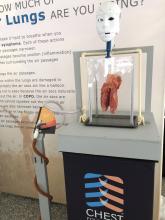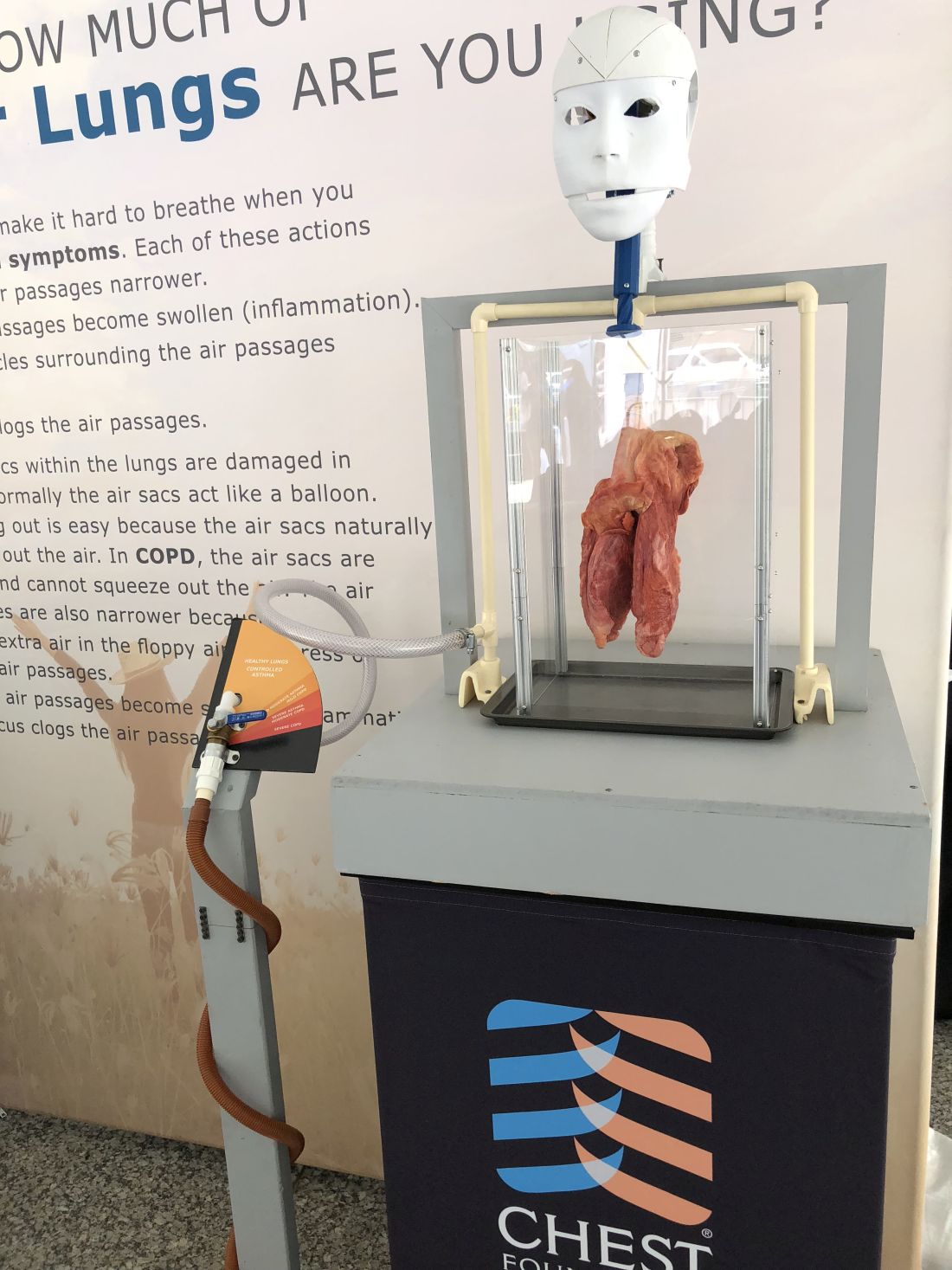User login
The robots are coming – at least according to a report,1 which states that Google created an artificial intelligence model that was able to detect lung cancer and cut back on false-positives at a rate that beat experienced radiologists.
As a fan of Star Wars, sci-fi, and innovation, in general – I say, bring it on! It’s an exciting trend in medicine to see technology that has already changed the way we work and live enter into the world of health care. And, this is not about replacing humans either (like what occurs in a lot of sci-fi ); this technology will potentially provide clinicians with the tools they can use to improve outcomes for their patients.
The researchers for this study used a system called convolutional neural networks to study patterns in 3D CT scans. One advantage computers has over humans is that a computer can process the entire scan all at once while trained radiologists need to review individual slices of each scan to make their diagnosis.
While this technology will need more testing and large-scale trials before being used to diagnose patients’ disorders, the early results are encouraging. The researchers also picked a cancer that impacts so many of CHEST’s members and their patients. Lung cancer kills more Americans than any type of cancer while accounting for more than 25% of all cancer deaths annually.2 In a statistic that many people find shocking, lung cancer actually kills more women than breast, ovarian, and uterine cancers combined.3 Given the devastation of this disease, we can use all of the help we can get. Another positive from this study that might be overlooked is the rate of improvement for false-positive results. This could be a major benefit of both saving the time and preventing invasive treatments or attempts to confirm a diagnosis.
This news is exciting for everyone trying to (as we say at CHEST) crush lung disease, but seeing AI in medicine is not surprising, because we are already using it at CHEST. The AI projects at CHEST include analyzing the types of activities that are most beneficial to members and building predictive analytics models for a project. These were only initial forays into using this new technology. One of the even more mind-blowing developments has been rolling out natural language processing4 for our internal data reporting.
This is a new development, and much like the Google lung cancer study, we cannot tell you what the end result will be. What we can say is that it’s likely to change the way we work and provide new opportunities to create analytics solutions for our partners.
CHEST is not “just” a medical association: we are also an innovative group using the latest tools to create a better future for members, partners, and ,ultimately, patients and their families.
Mr. Jackson is CHEST Chief Innovation Officer & Vice President of Market Growth and Innovation.
References
1. https://www.statnews.com/2019/05/20/googles-ai-improves-accuracy-of-lung-cancer-diagnosis-study-shows/. Accessed July 17, 2019.
2. https://foundation.chestnet.org/patient-education-resources/lung-cancer/. Accessed July 17, 2019.
3. https://foundation.chestnet.org/wp-content/uploads/2017/01/15110313_10154723685773104_3710772562030977299_o-1.png. Accessed July 17, 2019.
4. https://www.tableau.com/products/new-features/ask-data. Accessed July 17, 2019.
*This article originally appeared as a blog July 1, 2019, on https://insights.chestnet.org/.
The robots are coming – at least according to a report,1 which states that Google created an artificial intelligence model that was able to detect lung cancer and cut back on false-positives at a rate that beat experienced radiologists.
As a fan of Star Wars, sci-fi, and innovation, in general – I say, bring it on! It’s an exciting trend in medicine to see technology that has already changed the way we work and live enter into the world of health care. And, this is not about replacing humans either (like what occurs in a lot of sci-fi ); this technology will potentially provide clinicians with the tools they can use to improve outcomes for their patients.
The researchers for this study used a system called convolutional neural networks to study patterns in 3D CT scans. One advantage computers has over humans is that a computer can process the entire scan all at once while trained radiologists need to review individual slices of each scan to make their diagnosis.
While this technology will need more testing and large-scale trials before being used to diagnose patients’ disorders, the early results are encouraging. The researchers also picked a cancer that impacts so many of CHEST’s members and their patients. Lung cancer kills more Americans than any type of cancer while accounting for more than 25% of all cancer deaths annually.2 In a statistic that many people find shocking, lung cancer actually kills more women than breast, ovarian, and uterine cancers combined.3 Given the devastation of this disease, we can use all of the help we can get. Another positive from this study that might be overlooked is the rate of improvement for false-positive results. This could be a major benefit of both saving the time and preventing invasive treatments or attempts to confirm a diagnosis.
This news is exciting for everyone trying to (as we say at CHEST) crush lung disease, but seeing AI in medicine is not surprising, because we are already using it at CHEST. The AI projects at CHEST include analyzing the types of activities that are most beneficial to members and building predictive analytics models for a project. These were only initial forays into using this new technology. One of the even more mind-blowing developments has been rolling out natural language processing4 for our internal data reporting.
This is a new development, and much like the Google lung cancer study, we cannot tell you what the end result will be. What we can say is that it’s likely to change the way we work and provide new opportunities to create analytics solutions for our partners.
CHEST is not “just” a medical association: we are also an innovative group using the latest tools to create a better future for members, partners, and ,ultimately, patients and their families.
Mr. Jackson is CHEST Chief Innovation Officer & Vice President of Market Growth and Innovation.
References
1. https://www.statnews.com/2019/05/20/googles-ai-improves-accuracy-of-lung-cancer-diagnosis-study-shows/. Accessed July 17, 2019.
2. https://foundation.chestnet.org/patient-education-resources/lung-cancer/. Accessed July 17, 2019.
3. https://foundation.chestnet.org/wp-content/uploads/2017/01/15110313_10154723685773104_3710772562030977299_o-1.png. Accessed July 17, 2019.
4. https://www.tableau.com/products/new-features/ask-data. Accessed July 17, 2019.
*This article originally appeared as a blog July 1, 2019, on https://insights.chestnet.org/.
The robots are coming – at least according to a report,1 which states that Google created an artificial intelligence model that was able to detect lung cancer and cut back on false-positives at a rate that beat experienced radiologists.
As a fan of Star Wars, sci-fi, and innovation, in general – I say, bring it on! It’s an exciting trend in medicine to see technology that has already changed the way we work and live enter into the world of health care. And, this is not about replacing humans either (like what occurs in a lot of sci-fi ); this technology will potentially provide clinicians with the tools they can use to improve outcomes for their patients.
The researchers for this study used a system called convolutional neural networks to study patterns in 3D CT scans. One advantage computers has over humans is that a computer can process the entire scan all at once while trained radiologists need to review individual slices of each scan to make their diagnosis.
While this technology will need more testing and large-scale trials before being used to diagnose patients’ disorders, the early results are encouraging. The researchers also picked a cancer that impacts so many of CHEST’s members and their patients. Lung cancer kills more Americans than any type of cancer while accounting for more than 25% of all cancer deaths annually.2 In a statistic that many people find shocking, lung cancer actually kills more women than breast, ovarian, and uterine cancers combined.3 Given the devastation of this disease, we can use all of the help we can get. Another positive from this study that might be overlooked is the rate of improvement for false-positive results. This could be a major benefit of both saving the time and preventing invasive treatments or attempts to confirm a diagnosis.
This news is exciting for everyone trying to (as we say at CHEST) crush lung disease, but seeing AI in medicine is not surprising, because we are already using it at CHEST. The AI projects at CHEST include analyzing the types of activities that are most beneficial to members and building predictive analytics models for a project. These were only initial forays into using this new technology. One of the even more mind-blowing developments has been rolling out natural language processing4 for our internal data reporting.
This is a new development, and much like the Google lung cancer study, we cannot tell you what the end result will be. What we can say is that it’s likely to change the way we work and provide new opportunities to create analytics solutions for our partners.
CHEST is not “just” a medical association: we are also an innovative group using the latest tools to create a better future for members, partners, and ,ultimately, patients and their families.
Mr. Jackson is CHEST Chief Innovation Officer & Vice President of Market Growth and Innovation.
References
1. https://www.statnews.com/2019/05/20/googles-ai-improves-accuracy-of-lung-cancer-diagnosis-study-shows/. Accessed July 17, 2019.
2. https://foundation.chestnet.org/patient-education-resources/lung-cancer/. Accessed July 17, 2019.
3. https://foundation.chestnet.org/wp-content/uploads/2017/01/15110313_10154723685773104_3710772562030977299_o-1.png. Accessed July 17, 2019.
4. https://www.tableau.com/products/new-features/ask-data. Accessed July 17, 2019.
*This article originally appeared as a blog July 1, 2019, on https://insights.chestnet.org/.

